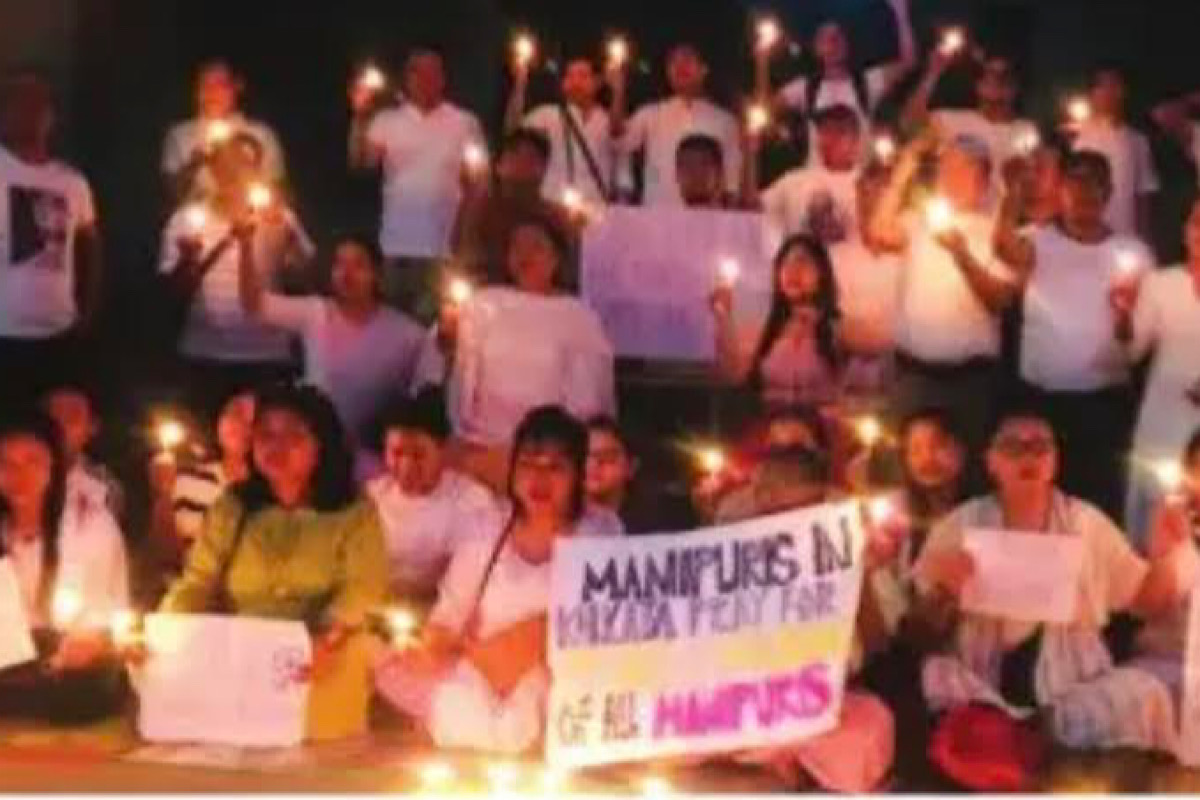Meghalaya: Curfew imposed following violence at Ramakrishna Mission School
Amid rising violence and property damage in Mawkynrew village in Meghalaya, curfew has been imposed in the village to prevent further unrest.

Manipuris in Kolkata pray for peace in home state (photo:SNS)
The violence in the Indian state of Manipur bordering Myanmar began on May 3 when tribal group Kuki clashed with a non-tribal group, the ethnic majority Meitei, over economic, social, and political benefits and quotas given to the tribes. The ethnic conflict, which left more than 80 people dead, hundreds injured, and nearly 35 thousand people displaced, the state has turned into a battle zone.
Why did the latest Kuki-Meitei unrest start?
Advertisement
The Manipur government recently made a few decisions and took some actions that the Kuki community has come to perceive as discriminatory and unsafe. The two most notable recent catalysts that led to the ethnic conflict are the forest eviction drive and the Meiteis’ demand for ST status — and it has widened the chasm between the Meiteis and tribals during the past ten years on a number of issues. Since Kukis live in the Hill Area, Kuki organisations have argued that the expulsion violates Article 371C of the Indian Constitution.
(Article 371C provides for the creation of a committee of the Manipur Legislative Assembly consisting of the members elected from the Hill Areas of the state and Governor shall have responsibility for the proper functioning of that committee.)
Advertisement
Migration from the neighbouring areas
The February 2021 coup in Myanmar has caused a refugee crisis in Northeast India. According to Meitei leaders, the number of villages in the Churachandpur district has suddenly increased.
War on Drugs campaign’
The Manipur government launched a ‘War on Drugs’ campaign in 2017 to combat illegal poppy cultivation and arrested 873 people from Kuki-Chin community. Subsequently, these drives against encroachers and illicit poppy cultivators attracted large-scale protests, especially in the Kuki-dominated districts. Many such protests have also turned violent.
Why Kukis are against ST status for Meiteis?
Kukis, who are already part of the ST list see this as a sign of their own slices of the reservation getting smaller. Kukis fear that ST status to the Meiteis would lead to the loss of job opportunities to them and allow (Meiteis) to acquire land in the hills and push the tribals out.
The majority of the state’s money and development efforts are concentrated in the Meitei-dominated Imphal Valley, despite the fact that tribal (hilly) areas make up 90 percent of its
geographical area.
The Meitei people’s language which is also called Manipuri is listed in the Constitution’s Eighth Schedule, and many of them are eligible for benefits related to their status as SC, OBC, or EWS.
Why does the Meitei community want ST Status?
Since 2012, the Meitei community, led by the Scheduled Tribes Demand Committee of Manipur (STDCM), has been demanding ST status in order to receive constitutional protections for the preservation of their culture, language, and identity.
Before the Manipur State and the Union of India merged in 1949, the Meiteis were designated as a tribe. According to the Meiteis The ST status is needed to “preserve” the community and “save the ancestral land, tradition, culture, and language” of the Meiteis. The ST status would provide constitutional safeguards against outsiders and restrict land ownership by non-tribals in the Imphal Valley.
What is Manipur’s ethnic composition?
The hills comprising 90 per cent of the geographical area are inhabited by more than 35 per cent recognised tribes.
The valley comprising about 10 per cent of Manipur’s landmass, is dominated by the non-tribal Meiteis who account for more than 64 per cent of the population of the State.
Way forward in resolving the matter
Strengthening local governance institutions in the hill areas can empower the tribal communities to participate in decision-making processes and ensure that their voices are heard.
This can be achieved by devolving power and resources to the local level and promoting grassroots democracy. There’s a need to increase the monitoring along the border areas to prevent the incursion of illegal immigrants from Myanmar.
Strengthening economic and diplomatic ties with
neighbouring countries can help enhance regional stability and security.
The criteria for ST status to Meiteis should be examined thoroughly based on several committee reports like Lokur Committee (1965), Bhuria Commission (2004), etc.
The government must guarantee a fair and open legal system in order to stop security officers from abusing their power.
Advertisement